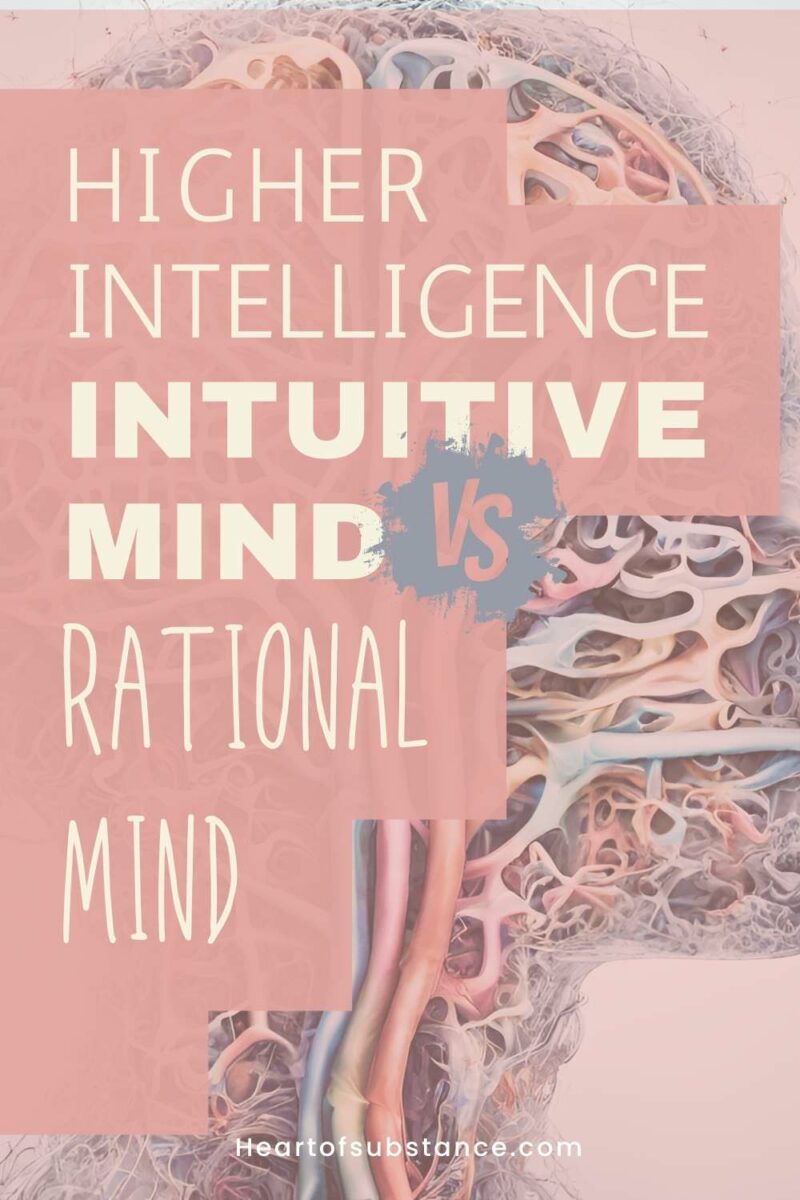We aren’t schooled to develop our intuitive mind like we do our logic-driven rational mind.
Like many others, I believe we are all born with intuitive power, but it becomes stifled on entering our logic-focused schooling system.

Logic doesn’t provide all the answers, and while rational thinking is advantageous, Gerd Gigerenzer, a director at the Max Planck Institute for Human Development, says intuition steps up the intelligence (Forbes 21 Feb 2017).
Albert Einstein on intuitive vs rational mind
The intuitive mind is a sacred gift and the rational mind is a faithful servant. We have created a society that honors the servant and has forgotten the gift.
Albert Einstein
Einstein’s quote serves as a reminder that while rationality is essential, it is equally important to nurture and respect our intuitive abilities.
Einstein, a renowned physicist known for his theory of relativity, often emphasized the importance of intuition and creativity in addition to rational thinking in scientific and societal advancements.
what is an intuitive?
An intuitive is someone who listens to their intuition. If you think you show signs, assess your intuition with this quiz.
‘Psychic intuition’ or ESP is what people often hear, but this use of words results in it being thought of as some ‘freakish’ or supernatural ability.
Being intuitive is something we can all develop, I believe. Are you highly intuitive? Check out the signs indicating highly intuitive people.
Some people use other words to describe it, such as ‘gut feelings’, ‘hunches’, ‘a sixth sense’, ‘flashes of insight’, ‘lightbulb moments’, and ‘sparks of inspiration’.
The more you trust and practice using your intuition, the better you become at deciding what’s best for you.
The formula for winning in this way is known and practiced by some of the most famous people in the world. However, it still requires both rational and intuitive thinking.
So why does this matter?
Using a rational mind with intuition for career success and better aligned relationships offers us a more fulfilling life. An intuitive mind can also potentially save your life or that of others as happens with fire rescue staff or the folk I list below.
Here’s a list of well-known people who accredit their wins to listening to their intuition and going beyond logic.
1. Former Special Air Service commando – John Taske
John Taske is famous for surviving a climb of Mt Everest that ended in tragedy for others on 10-11 May 1996.
Taske, an Australian anaesthetist and ex SAS commando, was 56 at the time.
He attributes his survival to his intuitive mind. Following his intuition, he aborted his climb just 300 meters shy of the Mt Everest peak. Unfortunately, others continued based on their rational thinking (that all conditions were right) and perished.
2. Australian mountain climber and adventurer – Jon Muir
Jon Muir (1961–) is known for his ‘sixth sense.’ He once convinced four British climbers to turn back from attempting the ‘ Rolling Stone’ on the North Face of the Grandes Jorasses in a 1983 trip, even though conditions seemed perfect.
The north face of the Grandes Jorasses is in France and is part of the Mont Blanc massif.
His intuition saved their lives from a massive rockfall that had been unforeseen (‘At the edge’, 1990, Rock, no. 12, p. 27).
3. Legendary investor – Warren Buffet
Warren Buffet doesn’t follow what’s rational when it comes to investing.
He is known for saying: “be fearful when others are greedy and to be greedy when others are fearful.”
4. A military strategist who saved the world
Stanislav Petrov defied military protocol and avoided a large-scale nuclear war. He followed his intuition and deemed early warnings of successive US missile launches in the Russian detection system as false alarms.
He was right! — the Russian missile detection system was malfunctioning. The US avoided an erroneous attack, and the world avoided a nuclear disaster as a result.
Watch the movie: The Man Who Saved the World – starring Peter Anthony to see how he did this.
5. American media personality – Opray Winfrey
Opray is quoted as saying: “The universe is always trying to get your attention.”
She has trusted her inner voice her entire life as she explains in her biography, What I Know for Sure.
6. The genius physicist – Albert Einstein
Einstein gained insights intuitively, imagining patterns and images, the way an artist would for inspiration.
The television series, Genius, gives an expansive story on the private life of Albert Einstein.
The only real valuable thing is intuition.
Albert Einstein
7. French military and political leader – Napoleon Bonaparte
Napoleon dominated the European battlefield based on strategies using his intuition (combined with rational thinking), see more in my article How to ‘Just Know’ What’s Right.
8. A visionary scientist – Nikola Tesla
Tesla is said to have had incredibly powerful intuition, which led him to establish 700 patents worldwide for inventions he created.
My brain is only a receiver, in the Universe, there is a core from which we obtain knowledge, strength, and inspiration. I have not penetrated into the secrets of this core, but I know that it exists.
Nikola Tesla
And let us not forget Steve Jobs
Steve Jobs famously said:
“Don’t be trapped by dogma, which is living with the results of other people’s thinking. Don’t let the noise of other’s opinions drown out your own inner voice. And most important, have the courage to follow your heart and intuition. They somehow already know what you truly want to become.”
Consider this:
“Intuition is what allows a scientist, analyst, or strategist to look at an overwhelming amount of data and say… this is what we can ignore for now so that we can focus on these other possibilities.”
~ Bruce Kasanoff, Forbes, 29 March 2017
Intuition power advances in technology
Artificial intelligence is now entering a phase of going beyond the logic level of intelligence (see this TED talk: the incredible inventions of intuitive AI).
This new technology uses intuitive processes to augment the logic ones (programming) that pose restrictions to further advancement.
This advancement is said to be beyond that of human intelligence.
I wonder why our schooling does not advance our intuitive abilities to augment our intelligence in the same way. Imagine that?!
In our world of tight regulation, rules, and legalities, being governed by logic, we are at risk of losing our most precious power…intuition.
That is unless! we consciously develop a good habit regime to work it like a muscle in our bodies — my take.
Gut Feelings: The Intelligence of the Unconscious, offers more on that.
by Gerd Gigerenzer (affiliate link)
Available at AmazonIf all you do is sit in a chair and trust your intuition, you are not exercising much intelligence. But if you take a deep dive into a subject and study numerous possibilities, you are exercising intelligence when your gut instinct tells you what is – and isn’t – important.
Gerd Gigerenzer





